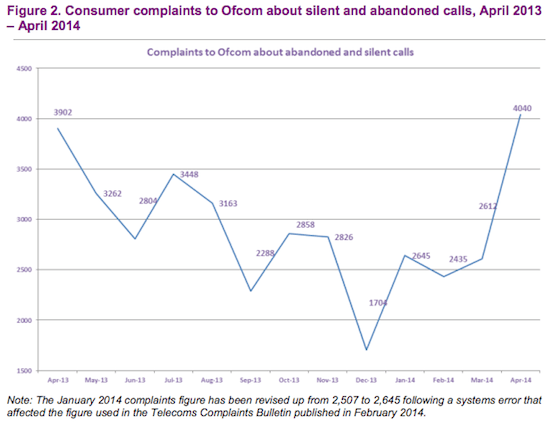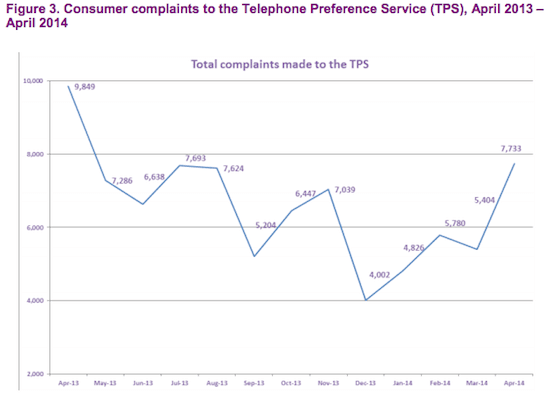Home > TV & Broadband > News > Silent call complaints resurge
Silent call complaints resurge
THE number of complaints about abandoned and silent calls has soared in the past few months, according to figures from Ofcom's latest Telecoms Complaints Bulletin.

The watchdog's report found that there were 4,040 complaints about nuisance calls in April 2014, compared to just 1,704 in December 2013, a 137% increase in just four months.
Abandoned and silent calls are usually as a result of companies using predictive diallers to dial numbers automatically, only connecting to a call centre agent when the recipient answers.

SOURCE: Ofcom Telecoms Complaints Bulletin 2014.
Diallers can be used without issue (apart from the nuisance of the call) but problems arise when the agent is busy or cancels the call, or the organisation is using Answer Machine Detection (AMD) technology. In either of these cases, the recipient will just hear silence or the call will be abandoned.
The machines can call so many people that just one of two really persistent companies can really make an impact on complaints, as seems to be the case here.
Some have suggested that an increase in the number of people clued up on the official complaints procedure could also have contributed to the increase.
Increased complaints
In the 12 months to April 2014, the number of complaints about silent and abandoned calls topped 34,000, averaging out at 2,840 a month.
However, complaints to Ofcom rose 55% between March and April, peaking at 4,040.
According to the watchdog, over 800 of those complaints were about just one phone number. Ofcom has taken action and those calls have now stopped.
That being the case, next month's bulletin could well show that complaints fell over May, unless of course those same bothersome callers have switched numbers and kept on going.
In addition, it's unclear whether telemarketing and market research companies have really increased their activities significantly or whether consumers are just more aware of how to put in an official complaint.
There has been a lot of media coverage about abandoned and silent calls over the past year, with many consumer groups campaigning for more action to be taken and guides produced on how to stop them.
According to Ofcom, "the Information Commissioner's Office (ICO) is making an example of companies that flout the law, and making sure everyone knows about it - which all helps to raise awareness".
In other words, more people are taking their complaint through official channels instead of putting up with the problem.
Getting rid of silent calls
A couple of months ago, the Government unveiled its "nuisance calls action plan" in partnership with the telecoms industry, consumer groups and regulators - including Ofcom. The plan suggests lower thresholds for punishment and higher fines of up to 20% of annual turnover.
This is just one route the watchdog is going down.
It already has some guidance in place, such as saying organisations should play an automated message if a call has been abandoned to prevent the unwanted distress caused by nuisance calls.
Further action being taken is the review of its silent and abandoned calls guidelines with the aim of strengthening them and adopting a call tracing standard, developed by the Network Interoperability Consultative Committee (NICC), which should enable Ofcom to track down the companies making these calls.
Just last year TalkTalk paid a £750,000 fine for making 9,000 silent or abandoned calls in 2011. TalkTalk exceeded the limit for nuisance calls on four separate occasions within seven weeks.
What's worse than a silent call? A not silent one
Silent and abandoned calls are a nuisance, but so are unsolicited marketing calls.
Complaints about unwanted marketing calls have also increased significantly since December 2013.
In April 2014, the TPS received 7,733 complaints, compared to just 4,002 at the end of last year. Despite the 93% over four months, complaints were still lower than in April 2013, when they were closer to 10,000.

SOURCE: Ofcom Telecoms Complaints Bulletin 2014.
The TPS manages a register on behalf of Ofcom. It contains a list of people that do not want to receive marketing calls. In order for a complaint to be made, the person must have been registered with the TPS for at least 28 days.
To establish just how effective registering with the TPS is at stopping unsolicited marketing calls, Ofcom and the ICO have commissioned a study. The results of which will be available in summer 2014.
Receive consumer updates that matter in our newsletter

We are independent of all of the products and services we compare.

We order our comparison tables by price or feature and never by referral revenue.

We donate at least 5% of our profits to charity, and we aim to be climate positive.
Latest News

20 February 2026
Virgin Media complaints hit six-year low
18 February 2026
Virgin Media O2 owners to buy Netomnia parent in £2bn deal
18 February 2026
HBO Max UK launch confirmed for MarchReceive consumer updates that matter in our newsletter


